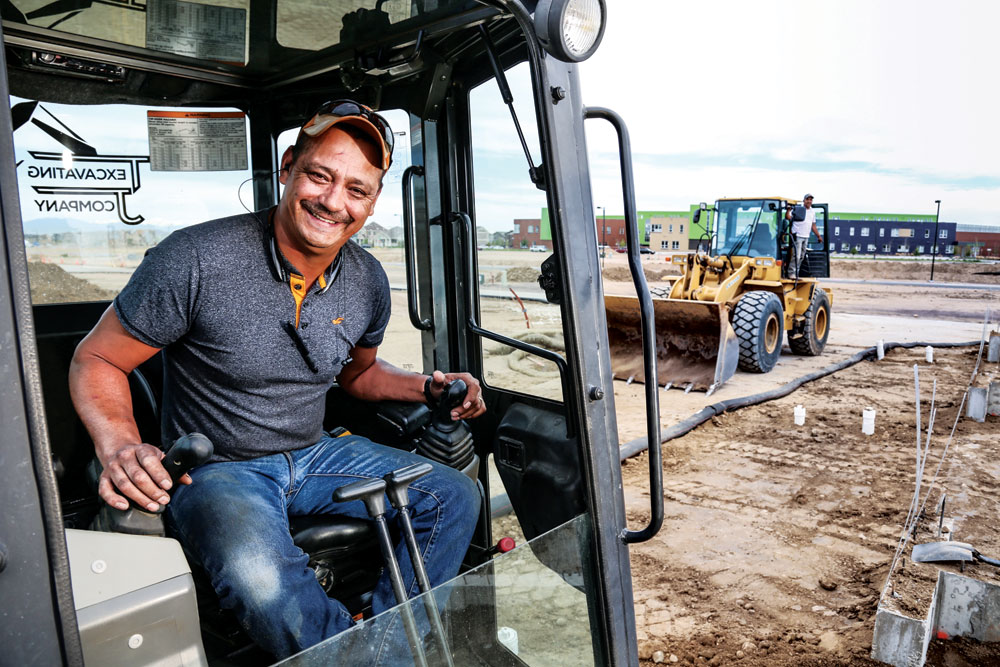
Juan Molinar immigrated to the U.S. from Mexico at the age of 17 with only a 6th grade education. Since then, the father of five learned English and how to read blueprints and became a U.S. citizen. After a career as a construction superintendent, he and his brother-in-law Marco Aguilar (standing on the front end loader) founded T.J.’s Excavating, which has numerous projects in Stapleton.
For hundreds of years, industrious and courageous people have emigrated from countries with limited freedom and opportunity, overcoming tremendous odds, to make a better life in the United States. The fire in their bellies that drove them to work hard and succeed has greatly contributed to what this country is today. But the country hasn’t always welcomed immigrants upon their arrival. Irish, Italian and Japanese are among immigrant groups now broadly accepted as part of the country’s melting pot that faced discrimination upon their arrival.
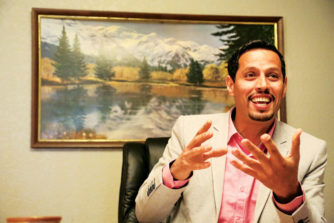
Mohamed Mouaddine arrived in the U.S. from Morocco just three months after 9/11 with empty pockets and is now the owner of Amina Auto Repair. “I immigrated based on…a philosophy that the United States is a strong country,” says Mouaddine. “It’s a country of immigrants. And it’s the most welcoming country, and the easiest country to integrate into and become part of.”
Now immigrants face more than individual prejudice as the country’s national policy moves in a direction that makes it more difficult for them to come here and create a better life. Though many citizens have risen to the defense of refugees and immigrants, others support the president’s views: that immigrants take jobs that should go to Americans, that they are criminals, or that they are a burden on our social services safety net without returning economic gain to our society.
The Front Porch met and talked with some local immigrant business owners about their journeys. Two of them were refugees, and all fled lives of poverty, hardship, and limited economic opportunity. Over the years since they immigrated, each has worked hard to master English, attain citizenship, and integrate into the economic and social fabric of the United States.
“Tough Situations”
For those who grow up in a first-world country – even those who grow up in relative poverty – it can be hard to fathom the deprivations that people around the globe experience as a daily fact of life.
Difficult circumstances mark the early years of many future immigrants and propel their desire to escape. Mohamed Mouaddine grew up in Beni Mellal, Morocco, a city about 150 miles inland from Casablanca. “I was born into poverty. There were eight siblings,” recalls Mouaddine. They lived in the back half of the family’s tiny market, behind a commercial refrigerator. There was no running water, and “the first time I had tennis shoes was when I went to middle school,” said Mouaddine. “It was a tough situation.”
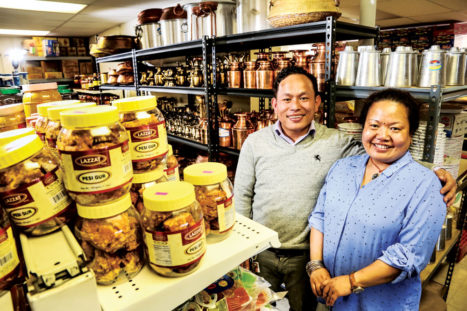
Tal Man Rai, pictured with his sister-in-law and business partner, Devi Rai, left his entire Bhutanese family behind in a Nepalese refugee camp when he immigrated in 2008 at the age of 23. Now the owner of a Northwest Aurora market, Rai says, “If you don’t like something, you have to do something better.”
Juan Molinar is originally from Gomez-Farias, Chihuahua, a small town in northern Mexico. Although he said his early life in Mexico was “fine,” he also said, “I only went to school until the 6th grade, and then I started working. I was helping my father in construction.” So, at an age when typical kids in Denver are in school, playing sports, or goofing off, Molinar entered the workforce and never returned to school.
Other immigrants have experienced not just poverty but persecution. Tal Man Rai was born in Bhutan, a small Himalayan country nestled between India and China, not far from Nepal. Although known as relatively peaceful country, it expelled most of its ethnic Lhotshampa people in the 1990’s. Nearly one-fifth of its population – approximately 108,000 people — were arrested, expelled, and their property seized.
Rai, like many Lhotshampa people, was sent to a refugee camp in Nepal as a toddler. The youngest of five, Rai spent the next 18 years growing up in the camps. Bhutanese refugees were denied the rights of citizenship or the right to work for pay equal to Nepalis, and the conditions were miserable. “There was a plastic tent for shelter, but it was really small,” said Rai. “Many people got sick and some died.”
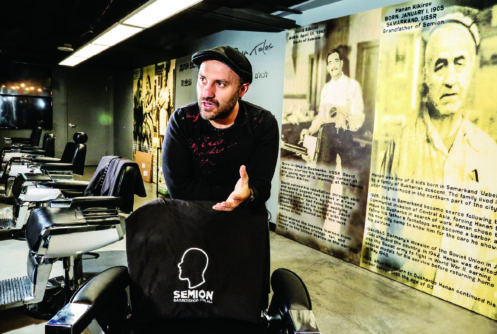
Fleeing violence and political instability in Tajikistan, Semion Kikirov and his family began anew in the U.S. in 1999 as refugees. His brother, Roman, continued a family tradition of cutting hair, opening the second Semion Barbershop for All at the Stanley Marketplace, which features floor to ceiling photos of his barber ancestors. “The American dream is still alive,” says Kikirov. “Trust me.”
Like Rai, Semion Kikirov was persecuted for his ethnicity. His family members are Bukharan Jews, a Central Asian ethno-religious group that dates back centuries. After the fall of the Soviet Union, when Kikirov was 19, “there were two civil wars, and my father decided it was time to move after he was forced out of his business.” Kikirov cited religious persecution as one of the main reasons the family immigrated to New York City in 1999 as refugees.
Escaping and Starting Anew
One of the most striking features of the stories told by these immigrants and refugees is their descriptions of their early days working in the United States.
Molinar moved to Dacono, Colorado in 1992 at the age of 17 with his first wife, who was a U.S. Citizen, and began working two jobs. “I started working on a farm, baling hay, driving tractors,” said Molinar. “I had two jobs and was working like 16 to 18 hours a day. I’d work on the farm and then work in a dairy for 8 – 10 hours at night, milking cows.” He was able to buy a house in Denver and began a career in the construction industry, working for the same company for 23 years. Learning English and how to read blueprints on the job, Molinar worked his way up to being a superintendent for the company.
Upon landing in New York with no money, Kikirov similarly worked multiple, low-paying jobs, delivering bread at 3am for $3.50 an hour. Never on welfare, he abandoned the study of law that he had been pursuing in Tajikistan, instead following a family tradition of barbering. His first job in America cutting hair was at Astor Place, New York’s largest barbershop and salon, where he joined dozens of other immigrants from around the world. “I was learning all the time,” said Kikirov, “…not just how to cut hair, but how to connect to the customers…how to make a relationship.” Upon moving to Denver, Kikirov became one of the top barbers at Floyd’s Barbershop.
The opportunity for Rai to come to the United States arose through the United Nations’ High Commission for Refugees. He was tired of being a refugee in Nepal, tired of being a second-class citizen, and when they told him he could go to Denver in 2008, he accepted the offer. It meant leaving behind his entire family, none of whom wanted to risk the trip. Rai took classes in English and job training through the Emily Griffith Opportunity School, and landed a job making sandwiches at DIA yogurt shop, earning minimum wage and saving money over four years. Rai then went into car sales, commuting daily to Loveland from his home in Aurora for a year before getting a position nearer home at Stevinson Toyota.
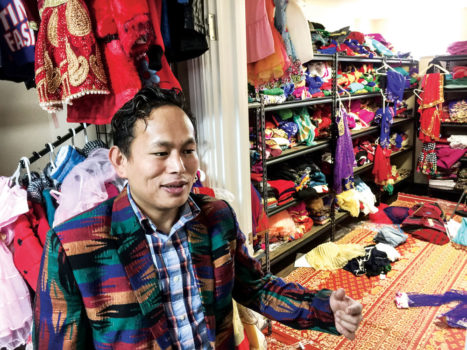
The Manakama Grocery owned by Tal Man Rai and Devi Rai offers an extensive collection of imported clothing, jewelry, and household goods from Nepal, India and other countries, as well as typical convenience store offerings.
In Morocco, Mouaddine had received a good education, thanks to the persistence of his mother, and also had learned how to fix cars, which got him a stable job working for the King of Morocco. When he arrived in Albuquerque three months after 9/11, virtually penniless, he had to start from scratch again. He put it in perspective. “When you start reading about the Founding Fathers, they just gave up everything they had, and they decided ‘maybe there’s a better life out there’ and just took the risk,” said Mouaddine. It is an incredible risk, he said, “to go somewhere where there’s no family, no back-up, no finances, no idea about the culture.”
Mouaddine credits the help of good people with smoothing his way. His first boss in the U.S. called General Motors on his behalf to get the repair manuals for him in French and bought him $6,000 worth of tools so he could work. Other people helped him network so he could relocate to Denver where he landed a steady job fixing cars at a dealership.
All of these immigrants took great risks, leaving behind family and friends to make a better life for themselves, and they began at the very bottom in America. With hard work, the persistence to learn English, and faith in the kindness of others, they each succeeded.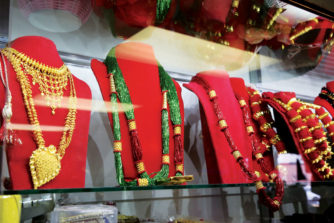
Entrepreneurship
The other element that the men share is what Mouaddine calls “the fire” – the desire to stop working for others, and the willingness to risk again to make that happen. Despite these immigrants having “made it” – attaining positions of relative security and financial success within a larger corporation – each of them felt a strong pull to strike out on his own.
Mouaddine had begun “flipping” cars and was looking for his own shop in 2011. When a lease deal fell through at the last minute, he was frustrated and decided to buy instead. After driving the streets of Stapleton, he recognized the potential a retail mechanic shop located at 25th and Dayton could have. “If those houses are right there, and I’m right here, I’m going to draw business from there,” he realized. Today, Amina Auto hums with activity, and the location near the new Stanley Marketplace and new Stapleton homes offers great potential for growth. He has brought family members, including brother Zach Mouaddine, to help at the shop and pursue their own American dreams.
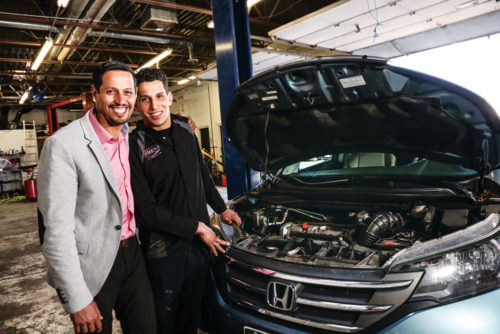
Mouaddine has shared his success in the U.S. with his family. Brother Zach Mouaddine helps out in the shop while building his own auto sales business.
Although Rai was making a good living selling cars, he realized, “I don’t want to work for other people.” He opened a downtown Denver convenience store in 2013 and then sold it to start another in Aurora. He opened the Nepali & Indian Bazaar in its current location on Dayton near Colfax in December 2016 with his sister-in-law, Devi Rai, and business is brisk at their well-stocked store. Not only does it sell the typical lottery tickets, sodas, and cigarettes, but there are hundreds of Indian and Nepali goods available, including food, household goods, and clothing.
Molinar had been feeling a lot of stress in his position at a large construction company, so last year he and his brother-in-law, Marco Aguilar, founded TJ Excavating, which digs foundations, water lines and sewer lines for new home construction. They have projects throughout Stapleton, including work for Thrive Builders. Reflecting on his journey and what it means to be an immigrant in the United States, Molinar said, “We are here to make a decent living, not to take anybody’s job away…and we’re doing some of the hardest work.”
Opening their first barber shop—named Semion—south of downtown in 2011 was a labor of love for Semion and brother Roman Kikirov, a CPA and full partner in the business. A tribute to their family and its long line of barbers, as well as to their deceased sister, Bella, the shop promises to be a “barbershop for all.” Their newest location at the Stanley Marketplace just opened, “We are here to grow and to help others grow. I always dreamed and knew it would happen one day,” said Kikirov.
As our country considers how to treat immigrants and refugees, it is important to listen to stories like these of our neighbors. By being offered a warm welcome and the opportunity to learn, these newcomers have worked hard; not only have they realized their own dreams, but they’ve made our community a better place.




0 Comments